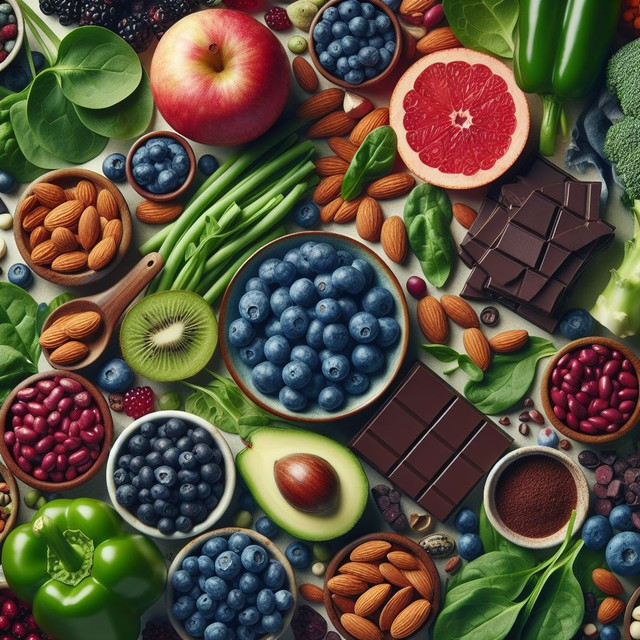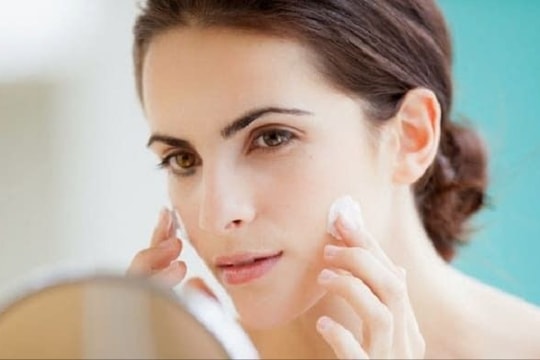Diet to improve melasma
Sometimes we are so preoccupied with what to put on our skin that we fail to notice that good nutrition can help improve melasma effectively.
1. The importance of diet for people with melasma
According to Dr. Ha Thi An Dien, a dermatologist, melasma is a hyperpigmentation condition with very complex causes and mechanisms. Melasma is often manifested as symmetrical dark brown patches or plaques on areas of skin exposed to sunlight.
The mechanism of melasma formation is understood as follows: The skin is made up of 3 layers, in which the epidermis contains melanocytes - the only cells capable of producing melanosomes and converting them into pigment (melanin).
Melanin has the ability to resist the harmful effects of ultraviolet rays (UV rays), control the synthesis of vitamin D3 and regulate body temperature locally. However, if melanin is produced in excess, it will accumulate and concentrate in one area of the skin, causing melasma.
To prevent hyperpigmentation in general and melasma in particular, we need to use measures to protect the skin from the effects of sunlight; Limit the use of birth control pills; Regularly check your health to detect endocrine disorders in the body for timely adjustment. In addition, it is necessary to have a healthy lifestyle and diet, full of nutrients, avoid staying up late, limit drinking alcohol...
In fact, in addition to the aging process, exposure to ultraviolet rays, hormonal imbalance, etc., diet is also a factor that has an important impact on skin health. If you maintain a diet lacking in nutrients, often snacking, fast food, processed foods, sugary drinks, etc., it will increase inflammation in the body, skin cells will soon age, become dull and lifeless.
Improving your diet to include foods rich in vitamins and antioxidants will not only help reduce dark spots but will also make your skin much healthier.

2. Essential nutrients for people with melasma
Antioxidants
Antioxidants are molecules that help fight oxidative stress. Oxidative stress caused by free radicals damages healthy cells and causes many diseases. Oxidative stress also negatively affects the aging process, including skin aging.
When the skin ages, it will show signs of: dry, rough skin surface, dull skin, loss of rosy brightness, many wrinkles, dark spots, age spots...
Research shows that eating foods rich in antioxidants and anti-inflammatory properties can help protect the skin and slow down damage. Some antioxidants in foods can also help reduce the harmful effects of UV rays.
The best way to supplement antioxidants is to use foods of plant origin such as: dark green leafy vegetables, fruits, berries, cocoa, herbs and spices, beans, artichokes, nuts, coffee, tea, whole grains... The more colorful the food, the richer in antioxidants.
Omega-3 fatty acids
Research has shown that eating foods rich in omega-3 fatty acids such as salmon, tuna, mackerel, herring, sardines; avocados, nuts... can help reduce inflammation that damages the skin.
Fatty fish rich in omega-3s are also high in protein, nutrients that are important for the body to produce collagen and elastin. These two molecules are responsible for the strength, plumpness, and elasticity of the skin.
Vitamin C
Vitamin C is a powerful antioxidant that helps maintain the health and integrity of the skin. It can reduce the appearance of dark spots by preventing the overproduction of skin pigments.
Vitamin C can also help treat skin problems such as sunburn, dry skin, acne, irritation and uneven skin tone. In particular, vitamin C is also an essential ingredient for collagen fibers to bind together. Collagen helps build and regenerate skin cells, keeping the skin healthy, youthful and smooth.
To prevent collagen loss, you should add foods rich in vitamin C to your daily diet. Food sources rich in vitamin C include citrus fruits, dark green leafy vegetables, bell peppers, melons, strawberries...
3. Suggest some foods to help brighten skin
Tomato
Tomatoes are rich in vitamin C and antioxidants that are beneficial for the skin. Tomatoes are concentrated in lycopene, a carotenoid that gives tomatoes their red color and acts as an antioxidant.
Lycopene can help protect the skin from the harmful rays of the sun. Drinking a glass of tomato juice every day is also very effective for oily skin, large pores, helping to reduce dark spots, dull skin, uneven skin tone.
Carrot
Carrots are one of the foods that are very good for the skin thanks to their beta carotene content. The antioxidant called beta-carotene creates the orange color in vegetables such as carrots, pumpkins, sweet potatoes, papayas... and is converted into vitamin A.
Vitamin A can help restore skin elasticity, promote skin cell turnover, protect skin from harmful free radicals, and keep skin looking bright and youthful.
Carotenoids accumulate in the outer layer of the skin to form a protective barrier against environmental stressors, including ultraviolet (UV) radiation. This helps protect against skin aging by promoting elasticity and hydration, while reducing the development of wrinkles and age spots.
Orange juice
Orange juice is also known as “sunshine juice” because a glass of orange juice can do wonders for the body, especially the skin.
Apart from its health benefits, pure orange juice is rich in vitamin C which not only gives a bright and glowing look to the skin but also helps in fighting against aging and sun damage. It is effective in treating sunburn, blackheads, and improving oily and dull skin.

Grape juice
Grape juice is rich in antioxidants, especially vitamin C, which can promote collagen formation and slow down the aging process of the skin, keeping the skin elastic and supple. Grape juice is also very helpful for damaged skin, helping to remove pigmentation and dark patches, giving a naturally bright skin.
Avocado
It’s no coincidence that avocado extract is so popular in skin care products. Avocados contain healthy fats that have anti-inflammatory properties and other nutrients that are good for overall health and can help prevent the negative effects of aging.
Pineapple
Pineapple is rich in antioxidants and vitamin C which helps boost immunity, smooth skin and improve dark spots on the skin.
You can eat the pineapple flesh directly or use pure pineapple juice to apply on your face. Or add pineapple to a homemade body scrub. Or you can combine crushed pineapple with a little milk and egg yolk and apply on your face to help moisturize and brighten your skin./.



